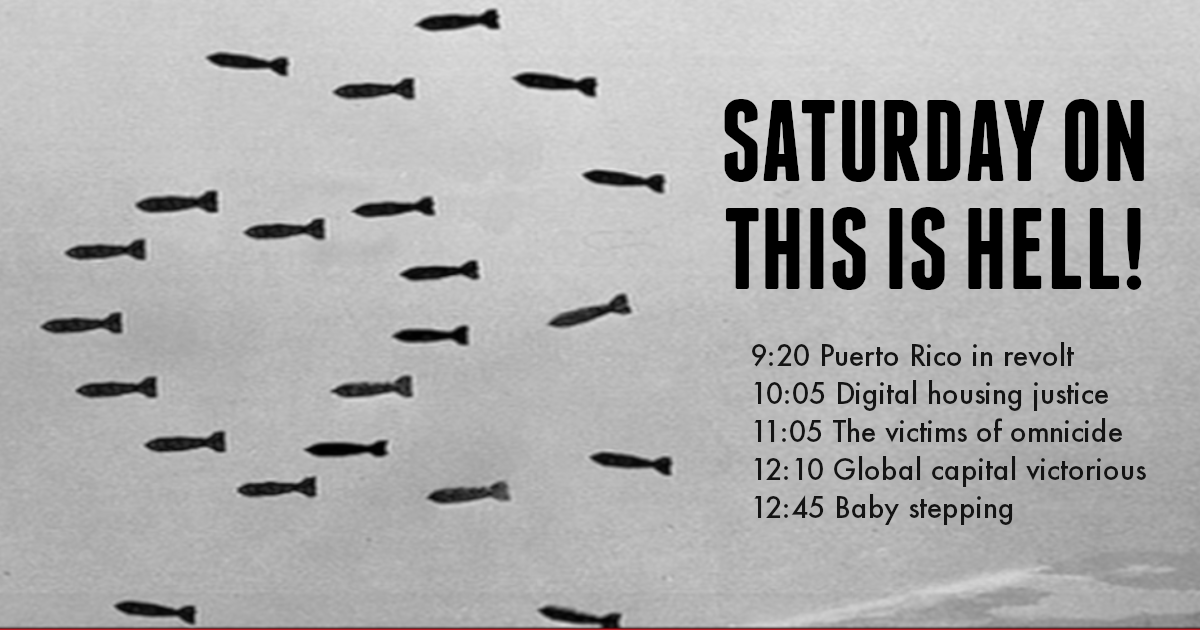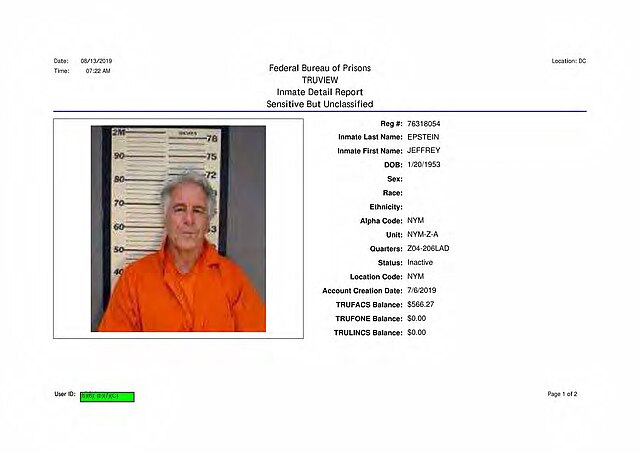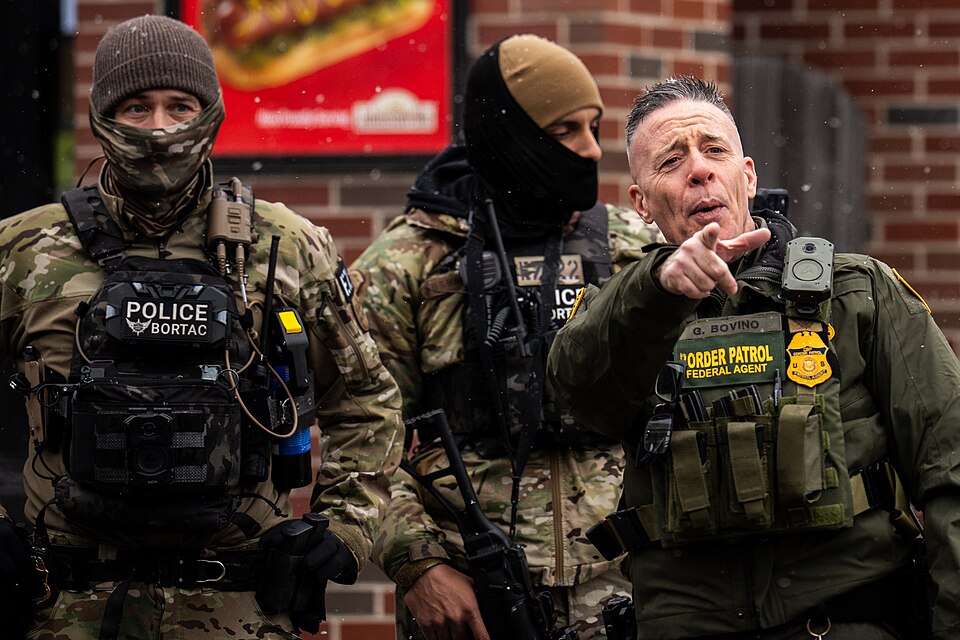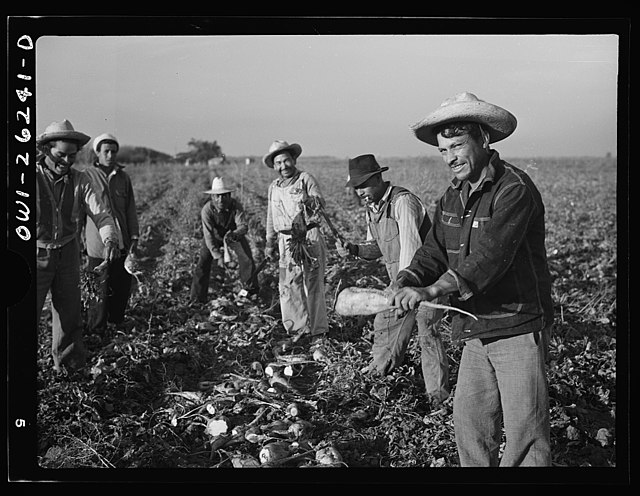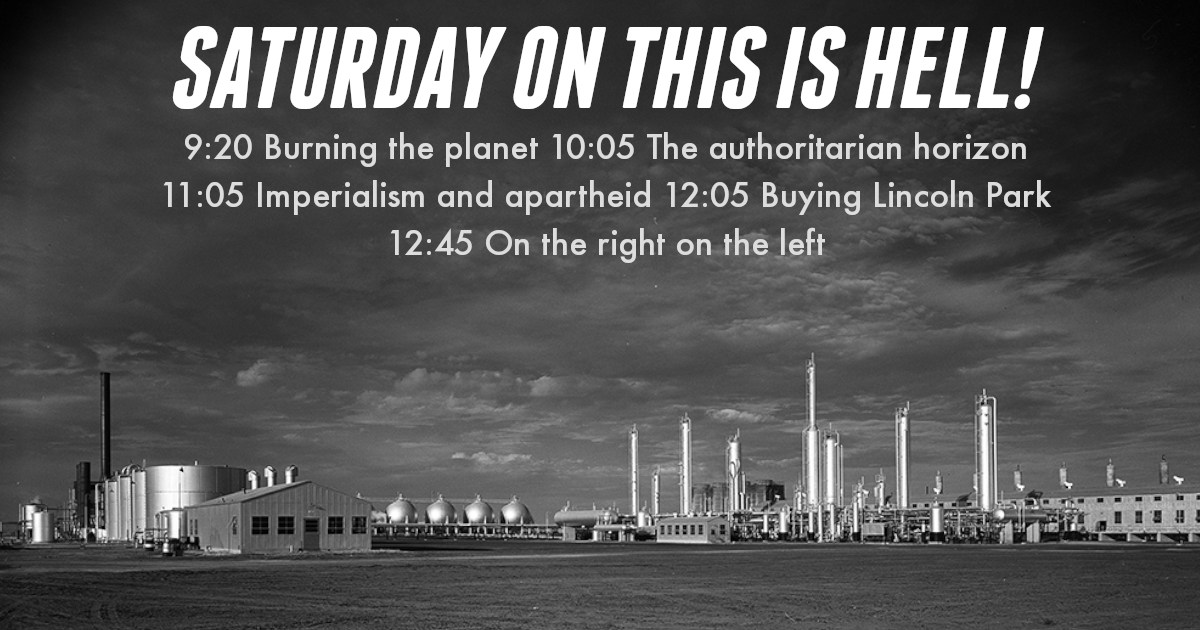Listen live from 9AM - 1:00PM Central on WNUR 89.3FM / stream at www.thisishell.com / subscribe to the podcast
9:20 - Our Man in San Juan, Dave Buchen reports on the rollercoaster that might become a revolution in Puerto Rico.
Dave wrote a short piece on Facebook about the protests, and will be reading a long piece on-air.
10:05 - Geographer Desiree Fields explores the mechanisms of exclusion and heirarchy in the digital housing market.
Desiree wrote the article Uploading Housing Inequality, Digitizing Housing Justice? for Public Books.
11:05 - Peace activist Kathy Kelly speaks for the victims of an omnicidal war machine - from Gaza to Kabul.
Kathy wrote the recent articles The Ongoing Dread in Gaza: So Many Names, So Many Lives and Remnants of War for Voices for Creative Nonviolence.
12:10 - Sociologist William I. Robinson points toward a new understanding of global capitalism in the 21st century.
William wrote the book Into the Tempest: Essays on the New Global Capitalism for Haymarket Books.
12:45 - In a Moment of Truth, Jeff Dorchen takes baby steps.
Welcome to the Moment of Truth, the thirst that is the drink.
I drove by two older white people arguing. Each seemed to be the representative of a group of onlookers. One demanded heatedly, belligerently, “Do you know what a stork is?” Challenging. But in a flash I’d driven past. And I could only wonder what this challenge was in reference to. Was it in fact a duel of ornithological knowledge?
Did you hear me? Was it? Are you listening? Are you even present?
Oh look at you. Good for you. You're here. That's more than most people can say. There are a few ways to look at it. Either we're all among a select few, or we're among a crappy few, or we're just a random set.
Don't be mean to me. I will cry. That's my trademark. That's what I was known for, as a baby. Oh, like you never cried when you were a baby. Well, I cried a lot. I cried every day. I cried and cried. I was known as the town crier.
I got the creative bug. Just feel creative. No ideas. Just a general feeling of creativity. I bet I could spread this bug. I bet I could spread creativity. Don't you all feel it? In your mind? And in your imagination? Which is also up here. Knock knock. Creativity. It's a feeling. You don't need ideas if you're creative. Think about it.
Everyone thinks they have imagination. Everyone in LA. People come here for three reasons: they think they have talent, or they think they have imagination, or they imagine they have talent.
So it shouldn’t be a total loss, I'm gonna get some work done while I'm up here. I got some vegetables to chop. Gotta make a stock. Got some dinner parties coming up. Gotta have homemade stock.
Stock is good as a basis for soup, sauces, and reheating/rehydrating savory leftovers. Rice, buckwheat groats, faro, and other grains are nice when made with stock. Some vegetables need to be blanched or boiled, and stock is the way to go. It adds richness and flavor to boiled things, things people are enamored with roasting these days, such as root vegetables, cauliflower, and Brussels sprouts. These can profit from a bit of blanching or even boiling in a stock before being put in the oven or under a broiler.
Hills, or even mountains, rise from the mist in the distance. Not really mist, more like haze, although unlike most days the haze is white with only a slight off-white tinge of smog and dust. Later today, I imagine, it will brown to an unsightly umber.
Ah, life. Life is a death... read more
Listen live from 9AM - 1:00PM Central on WNUR 89.3FM / stream at www.thisishell.com / subscribe to the podcast
9:20 - Journalist Brian Hioe reports on the mass protest wave against Hong Kong's extradition bill.
Brian wrote the article No End in Sight to Demonstrations in Hong Kong After Another Refusal by Lam to Withdraw Extradition Bill for New Bloom.
10:05 - Historian Raquel Varela explores the work and the workers behind Portugal's 1974 revolution.
Raquel is author of the book A People's History of the Portuguese Revolution from Pluto Press.
11:05 - Political scientist Steven Davis explains what people lose when public land is privatized.
Steven is author of the book In Defense of Public Lands: The Case against Privatization and Transfer from Temple University Press.
12:10 - African American studies scholar Marquis Bey traces the fugitive politics of Blackness and queerness.
Marquis is author of the book Them Goon Rules: Fugitive Essays on Radical Black Feminism from University of Arizona Press.
12:45 - In a Moment of Truth, Jeff Dorchen tests your ornithological knowledge.
Welcome to the Moment of Truth: the thirst that is the drink.
I don’t think we have to worry about the radical left persuading everyone not to vote, once the Democrats settle on a candidate that isn’t that ratty old chewed up bathrobe, Joe Biden. What we have to worry about is the rightwing pundits in the New York Times persuading the DNC to think like they do. “The Democratic Party is being pulled too far to the left,” is the refrain of these noted left-haters. David Brooks, Bret Stephens, Sydney Ember – these are the creeps of which to beware. Don’t listen to them, DNC. Brooks: “Democrats, don’t alienate me with your Medicare for all.” Man, if Medicare for all makes you vote for Dump, you’re the same asshole who supported W Bush, despite your “come to Jesus” BS of the last couple years. Climate change denier Bret Stephens also cautions the Dems not to be pulled too far left. The only person who’s not too far left for Stephens is maybe Duterte in the Philippines. And Sydney Ember, who you’ve probably never heard of, just deals in anti-Bernie clickbait. They’re all Mickey Mouse versions of urethra blockage Tucker Carlson, who also advises the Dems that “being pulled too far to the left will alienate the moderate undecided voter” or some similar sentiment. Really? If the Dems avoid being pulled to the left, you’ll stop calling them the party of evil socialism? Tucker? Tucker?
Our old friend George F. Will is certainly going to be making noises along these lines as the election actually approaches. You know, it’s not really approaching right now. It sits like a shadow in the distance, on the highway pavement, viewed through the reticulated air rippling in the heat. You can’t tell how far away it is, or even if it’s real, if it’s a dark wet stain on the horizon or merely a mirage. But we’re acting like this is the election year. That may be good. Maybe overreacting early in the game will avoid disaster later. This is how we should be responding to global warming. But our system only allows for political overreaction, as opposed to practical, methodical, well-advised, or sane overreaction.
George Will recently appeared on the local Los Angeles NPR affiliate, KPCC, broadcast out of Pasadena City College. That is how far he’s fallen. He’s had to enter the palace... read more
Listen live from 9AM - 1:00PM Central on WNUR 89.3FM / stream at www.thisishell.com / subscribe to the podcast
9:20 - Energy researcher Simon Pirani explains how fossil fuels powered global capitalism and the climate crisis.
Simon is author of Burning Up: A Global History of Fossil Fuel Consumption from Pluto Press.
10:05 - Cultural critic Henry Giroux surveys a political horizon of hate, brutality and populist authoritarianism.
Henry is author of The Terror of the Unforeseen from Los Angeles Review of Books.
11:05 - Historian Gerald Horne explores a century of international struggle against apartheid and Jim Crow.
Gerald is author of White Supremacy Confronted: U.S. Imperialism and Anti-Communism vs. the Liberation of Southern Africa from Rhodes to Mandela from International Publishers.
12:10 - Policy analyst Daniel Kay Hertz examines the gentrification of Lincoln Park, and who got left behind.
Daniel is author of The Battle of Lincoln Park: Urban Renewal and Gentrification in Chicago from Belt Publishing.
12:45 - In a Moment of Truth, Jeff Dorchen wonders why the right thinks anyone cares about their feelings about the left.
Welcome to the Moment of Truth, the thirst that is the drink.
On Tucker Carlson’s show, Donald Dump, the would-be dictator, or, more formally, would-be penis potato, asserted that public excretion of human waste only began when he took office. This is a man ostensibly from New York City, long known for such street fragrances. He said it in the midst of producing a muesli of nonsense phrases. The comical thing was Tucker nodding and grunting in agreement, as if to say, “Right, that’s exactly when I started pissing on the streets. I think we all did. Yeah, yeah, George Soros paid us to do it.”
And then I realized – November 9, 2016 – that is in fact the date when I took my vow of public urination and defecation. I started pooping and peeing all over my neighborhood, as if I had no respect for myself or anyone else. It’s inappropriate and disgraceful, but, like incontinent fascist Tucker Carlson, I can’t help myself.
Astrocracy: rule by the stars. Not rule by asses, that’s any rule. And not rule by astro-crock, though it is a crock of magical thinking, much like the principle that ruthless, unbridled greed will somehow benefit the many rather than just the few. And put an end to poverty, which is a sick joke on us. Capitalism requires that a visible percentage of the would-be work force be in brutal poverty. Out of one crock into another crock. Actually, it’ll be the same crock. Either way, there are thousands upon thousands of people living on the street, right here in the most wealthy and spiritually airheaded nation on Earth, and that won’t change until we somehow un-brainwash ourselves from our radical capitalist indoctrination, and of course our worship of Disney magic, which I’ll get to later.
The advent of the reality TV president has of course led, inevitably, to the appearance of the flaky New Age self-help entrepreneur/guru as prospective nominee. I’m not saying that idiot has a chance in hell of becoming president, but after 2016, hell is apparently not the worst place to locate your chances. If you’re an idiot.
Do I belittle Marianne Williamson? With her prescription of solving the world’s problems with unicorn flatulence and echinacea enemas? Oh, by all means, I do belittle her. Is it sexist for me to do so? I feel the same way about Deepak Chopra, Bikram Choudry, Tony Robbins, Dr. Oz, any number of snake-oil... read more
Listen live from 9AM - 1:00PM Central on WNUR 89.3FM / stream at www.thisishell.com / subscribe to the podcast
9:20 - Theorist Sophie Lewis explores surrogacy's place in a new, liberatory gestational politics.
Sophie is author of Full Surrogacy Now: Feminism Against Family from Verso.
10:05 - Writer Ben Burgis explains why and how the left should talk about leftism.
Ben is author of Give Them an Argument: Logic for the Left from Zero Books.
11:05 - Sociologist Esther Sullivan examines housing insecurity in America's mobile home parks.
Esther Sullivan is author of from Manufactured Insecurity: Mobile Home Parks and Americans’ Tenuous Right to Place from University of California Press.
12:10 - Journalist Eric Blanc explains what labor and the left can learn from striking teachers.
Eric is author of Red State Revolt: The Teachers’ Strike Wave and Working-Class Politics from Verso.
12:45 - In a Moment of Truth, Jeff Dorchen critiques our magical-thought-leaders.
